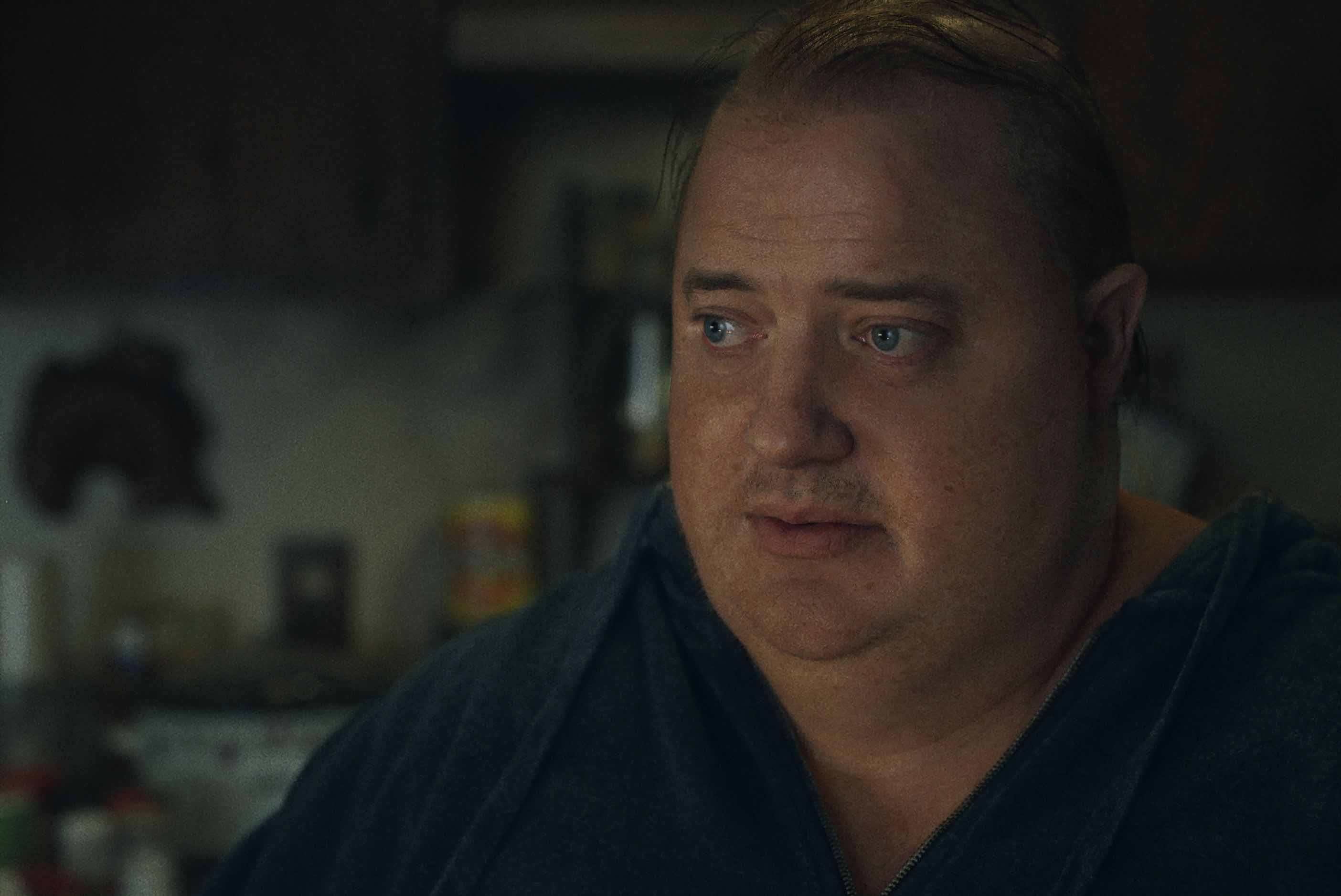Brendan Fraser is just so likable. When you see him on screen in 2022—those azure eyes gazing gently over a reassuring smile—you feel as if you’ve just reunited with a dear friend. And who can deny the joy of witnessing his recent return to prominence, watching him enjoy the success he’s now finally finding (deservedly so) after a difficult and painful period of personal tribulations? He was abused and abandoned by Hollywood, yet he isn’t bitter or self-pitying; he’s genuine, and he seems so grateful, so humble, which is such a rare quality in Hollywood.
In the ’90s and early-’00s, Fraser was prolific, appearing in an eclectic array of roles, convivial in each: reveling in gleefully meaningless idiocy in Airheads, proving himself deft at slapstick-silly (yet still oddly sexy) in George of the Jungle and as a well-meaning and blunderingly oblivious Mountie in Dudley Do-Right, and playing a medley of naive doofuses and corporeal cartoons opposite a sultry Elizabeth Hurley as Satan in Bedazzled. He took more serious roles, too: as a student forced to keep his Jewishness hidden from his bigoted prep school friends in the reactionary ’50s in School Ties; as a tragically flawed idealist who becomes ensconced in a love triangle in turbulent Saigon in Graham Greene’s The Quiet American; as Frankenstein director James Whale’s gardener, and object of desire, in Gods and Monsters.
And, of course, there’s his signature role as adventuring hero Rick O’Connell in the Hollywood hit The Mummy, which Fraser took after some marquee names—including Tom Cruise, who would go on to star in the next Mummy reboot 20 years later, a critical and commercial flop that quickly dissipated from cultural memory outside of its meme status—had turned it down. Casting Fraser was a bit of a risk for Universal, who badly needed a success. It paid off. Fraser has wonderful chemistry with the whole motley cast, which really makes the movie. He finds the kind of charisma that so many strive for—a harmonious union of cocky swagger and honorability. Just compare Frasier’s O’Connell to, say, Chris Pratt’s monotonous and predictable performance in the Guardians of the Galaxy or Jurassic World series: he’s vacant, a placeholder—no amount of time spent in the gym can give you charisma.
And now we have The Whale, Darren Aronofsky’s often-unpleasant adaptation of Samuel D. Hunter’s play about Charlie, a morbidly obese, gay recluse who teaches writing online. Charlie’s will to live has been eroding for a long time, and, as is a familiar habit of the severely depressed, he contemplates oblivion, which is starting to feel more appealing than suffering through another piteous day. The film is being touted as Frasier’s big comeback, and people who care about awards have been hyping him up for months. And it really is a beautifully empathetic performance; Fraser never denies the crestfallen man his dignity, never thinks of him as grotesque. He doesn’t see obesity as disgusting, but he understands why this man might hate himself. He understands pain and shame.
The Whale doesn’t want to make you think about your life: it wants you to feel bad... The veneration for Melville is odd, because the film has none of the novel’s bravado, none of its immense erudition or philosophical digression or aesthetic daring.
A lot has been said about the depiction of obesity and depression in The Whale (I’ll get to that, too), but what stayed with me, what agitated me, was the way Moby-Dick—that most famous of cetaceans, a white sperm whale mottled with the scars of so many failed whalers and the unmitigable obsession of the fanatical Captain Ahab—plays an important part of the film, and how Aronofsky and Hunter don’t really use the novel in any meaningful way. Melville’s whale is many things: a creation of endless metaphor; a massive phantom discussed with the grandiosity and reverence reserved for myths; a commodity sold for bones, blubber, baleen; an epic impossibility and an unstoppable inevitability that the peg-legged Ahab will chase to the bowels of hell; and, yes, he’s a whale—just a whale—a mysterious behemoth prowling the dark depths of the sea.

The whale, and Ahab’s pertinacious pursuit, can mean many things to many people. For Charlie, who still keeps a student’s paper on Moby-Dick that moved him however long ago, it offers something resembling hope. And not just the novel, but someone else’s reaction to the novel, someone articulating what it means to them. Maybe it makes him feel close to someone. Passion inspires passion. Melville’s novel makes Charlie think about his own life, and, in case we’re too dense to get that, he literally tells us, “This book made me think about my own life.” The Whale, however, doesn’t want to make you think about your life: it wants you to feel bad, to gawk at the sad fat man and pity him. The veneration for Melville is odd, too, because the film has none of the novel’s bravado, none of its immense erudition or philosophical digression or aesthetic daring.
Melville flaunts a spectacularly vast understanding of so many different things in so many different ways, and always with unabashed virtuosity. Moby-Dick is American literature’s most valiant attempt at greatness. Melville gives us the irreverent (Queequeg selling shrunken heads on Sunday), and the introspective (the prolonged exegesis on the color white), populates the ship with eccentric characters and their colorful banter, all described by a narrator of no particular importance other than the name he gives us and who disappears from time to time, receding into the background like a wave furling back as Melville delves into whatever subject compels him: punctilious and poetic descriptions of the minutiae of the sailor’s life, or the nitty-gritty of whaling, or when he lets loose long, gleaming, sinuous streams of language replete with majestic metaphors and surprising use of unusual vocabulary and allusions to the Bible that very few people will ever pick up on—just unspooling his thoughts, like the whale spinning round as they flense off the fat, all over the page.
Aronofsky is so obsessed with allegory and suffering that the film is pervaded by a suffocating sense of importance, self-consciously unhappy and more interested in depicting Charlie as something to pity rather than someone to understand.
And Melville is funny! He celebrates life and all its wonders! Aronofsky is not, and does not. Consider the formal fireworks of Requiem for a Dream, whose poster adorned the walls of so many dorms in the 2000s—how abstract and vivid it is, with every montage of dime bags and dilated eyes and every hyper-stylized trick of the camera intended to upset the viewer; that is the film’s purpose, to engender and intensify discomfort, with a similar intention—this obsession with misery—suffusing each of Aronofsky’s endeavors (save for The Fountain). Aesthetically and thematically, The Whale resembles The Wrestler, the director’s most restrained work that even his detractors can appreciate, a modest study of a man fading from his own life who will die doing what he loves, brought to wonderful, painful life by Mickey Rourke in another vulnerable role heralded as a comeback.
Unfortunately, you won’t find this kind of sensitivity or intimacy in The Whale. Aronofsky is so obsessed with allegory and suffering that the film is pervaded by a suffocating sense of importance, self-consciously unhappy and more interested in depicting Charlie as something to pity rather than someone to understand. When Aronofsky pulls back to fill the frame with Charlie’s great mass, the point of the shot is for us to feel bad because he’s fat. Aronofsky has always had a vision—no one can argue that mother! wasn’t totally committed to its own peculiar persuasion—and that is admirable. But The Whale’s vision is just sorrow and cruelty, all of it ersatz. Brendan Fraser is giving an authentic performance in a work of unironic artificiality. FL







